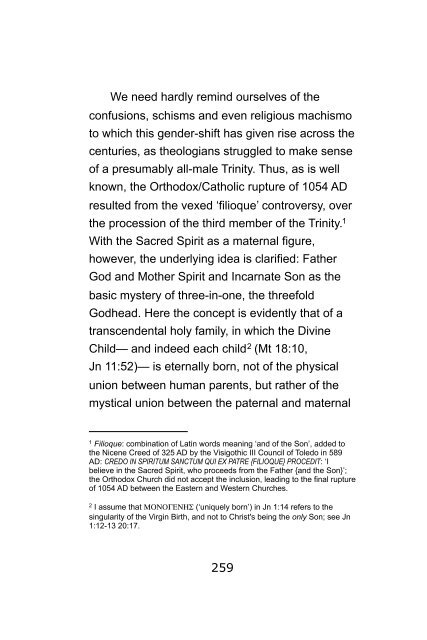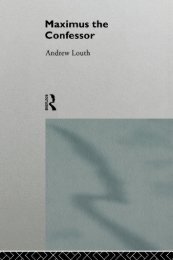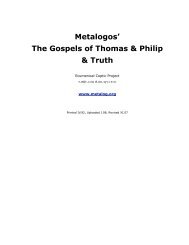- Page 1 and 2:
Metalogos The Gospels of Thomas & P
- Page 3 and 4:
Introduction In December of 1945 tw
- Page 5 and 6:
ecorded as Thomas the Apostle, one
- Page 7 and 8:
Messiah, whilst elaborating a metap
- Page 9 and 10:
Gen 1:31 (‘everything that He had
- Page 11 and 12:
thus, the Armenian canon includes a
- Page 13 and 14:
The translations of the texts thems
- Page 15 and 16:
Lastly, I have appended five essays
- Page 17 and 18:
Protestant, thruout Latin America;
- Page 19 and 20:
were composed by the Apostle Thomas
- Page 21 and 22:
London: Home & Van Thal, 1948; this
- Page 23 and 24:
Gospel from Oxyrhynchus (edited by
- Page 25 and 26:
Hammadi Codex I (two volumes, edite
- Page 27 and 28:
(translated by James Charlesworth).
- Page 29 and 30:
ON SAYINGS OF JESUS Darrell Turner,
- Page 31 and 32:
more interest to the general public
- Page 33 and 34:
century, or that the collection whi
- Page 35 and 36:
isolated from the rest of Christend
- Page 37 and 38:
importance for the study of early C
- Page 39 and 40:
Christianity by those who wanted to
- Page 41 and 42:
prejudice can assert that the canon
- Page 43 and 44:
the kingdom parables in the Gospel
- Page 45 and 46:
found in the Gospel of Thomas.... M
- Page 47 and 48:
Nicholas Perrin, ‘The Gospel of T
- Page 49 and 50:
These are the secret sayings° whic
- Page 51 and 52:
will not hesitate to ask a little c
- Page 53 and 54:
contrary to the spirit of the Greek
- Page 55 and 56:
120-fold. (multiple asyndeta; Mt 13
- Page 57 and 58:
hyh) r#) hyh) ahyh ashr ahyh I-Am W
- Page 59 and 60:
that I have come to cast peace upon
- Page 61 and 62:
earth, it produces a great plant an
- Page 63 and 64:
image° in the place of an image—
- Page 65 and 66:
Brother's eye. (=Mt 7:3-5) 27. (Yes
- Page 67 and 68:
The Letter of Aristeas 15-16: http:
- Page 69 and 70:
and take your garments and place th
- Page 71 and 72:
forth, knapsack on back, for unknow
- Page 73 and 74:
stretch two bows, and a slave canno
- Page 75 and 76:
them: That which you look for has a
- Page 77 and 78:
57. Yeshua says: The Sovereignty of
- Page 79 and 80:
the things of my Father. || (Salome
- Page 81 and 82:
My comrade is to be married and I m
- Page 83 and 84:
you are hated and persecuted and fi
- Page 85 and 86:
pearl for himself. You yourselves,
- Page 87 and 88:
82. Yeshua says: Whoever is close t
- Page 89 and 90:
yet the Son of Mankind has no place
- Page 91 and 92:
94. Yeshua [says:] Whoever seeks sh
- Page 93 and 94:
Caesar extort tribute from us. || H
- Page 95 and 96:
106. Yeshua says: When you make the
- Page 97 and 98:
(asyndeton; Th 87) 113. His Discipl
- Page 99 and 100:
(ti), as well as ¯ (syllable or ab
- Page 101 and 102:
Ac 5:15, glog is used for ΚΛΙΝ
- Page 103 and 104:
Jacob the Righteous (12): Heb bq(y
- Page 105 and 106:
eality (thus in Gen 1:1 LXX, Mk 1:1
- Page 107 and 108:
Biblio.23, textual notes (¹asyndet
- Page 109 and 110:
thr.3 (all of-him/it, C424a). Trans
- Page 111 and 112:
conventionality or artificiality of
- Page 113 and 114:
inherit anything. For how will the
- Page 115 and 116:
who came to him— these he set as
- Page 117 and 118:
they would not have designated anyt
- Page 119 and 120:
forever. There is empowerment grant
- Page 121 and 122:
18. Some say that Mariam was impreg
- Page 123 and 124:
first he arose and (then) he died.
- Page 125 and 126:
flesh, (but¹) this also is an inca
- Page 127 and 128:
the mountain, he was not made small
- Page 129 and 130:
perfect are conceived thru a kiss a
- Page 131 and 132:
acceptable. (Lev 2:13, Num 18:19, I
- Page 133 and 134:
entire place stands— whether the
- Page 135 and 136:
unless he has become like them. Not
- Page 137 and 138:
valued. But rather it has its great
- Page 139 and 140:
Stromata I.8.41, attributes to the
- Page 141 and 142:
62. The exaltation of mankind is no
- Page 143 and 144:
Yet one receives them in the mirror
- Page 145 and 146:
after this world, which is truly ev
- Page 147 and 148:
72. The truth did not come unto the
- Page 149 and 150:
outer, together with what is outsid
- Page 151 and 152:
79. Let (the) Bridal-Chamber not be
- Page 153 and 154:
conquest of 70 AD; ³Moses ben Nahm
- Page 155 and 156:
chamber. Those however who have mat
- Page 157 and 158:
90. Adam came into being from two v
- Page 159 and 160:
them, the repose occurs among them
- Page 161 and 162:
99. This world devours corpse(s)—
- Page 163 and 164:
The Father bestowed this upon him i
- Page 165 and 166:
and it belongs to the completely Pe
- Page 167 and 168:
BC China: ‘That which is one is o
- Page 169 and 170:
the world. Whenever that blows, its
- Page 171 and 172:
Lk 10:30-37, Th 24, =Pro 10:12 →
- Page 173 and 174:
east loves its like; so also every
- Page 175 and 176:
uprightly (is) difficult. How shall
- Page 177 and 178:
cast barley with straw and hay; to
- Page 179 and 180:
the Immaculate Marriage a true sacr
- Page 181 and 182:
destroyed (and¹) when it is expose
- Page 183 and 184:
ecognizing the truth, we shall find
- Page 185 and 186:
138. This ark shall be salvation fo
- Page 187 and 188:
separated shall be mated (and) [the
- Page 189 and 190:
Notes to Philip The reader is urged
- Page 191 and 192:
substitute; as in ‘Yom Kippur’:
- Page 193 and 194:
ΠΡΟΣΕΥΧΕΣΘΑΙ enjoins pr
- Page 195 and 196:
Eternal (9 10 109 143): see Aeon. E
- Page 197 and 198:
Africa's Great Rift Valley; NB appa
- Page 199 and 200:
Aristotelian species; note also the
- Page 201 and 202:
Paul (25 96 115): Latin ‘small’
- Page 203 and 204:
incest, male homosexuality or adult
- Page 205 and 206:
also Abraham Chill, Biblio.35. Tran
- Page 207 and 208: could see. (¹Ph 125) 3. Wherefore
- Page 209 and 210: 6. Therefore confusion was enraged
- Page 211 and 212: they were not truly wise. Then afte
- Page 213 and 214: the empty spaces of the terrors, he
- Page 215 and 216: who called, ascending unto him. And
- Page 217 and 218: Rev/Ap 1:8) 16. His wisdom meditate
- Page 219 and 220: fusion of the unity. For now their
- Page 221 and 222: came to the midst, and all his eman
- Page 223 and 224: themselves exist within the Father
- Page 225 and 226: to be nothing, neither considering
- Page 227 and 228: the infinity and the kindness of th
- Page 229 and 230: acquaintanceship unto those who in
- Page 231 and 232: the sense of smell and draws it to
- Page 233 and 234: transgressor so that he might have
- Page 235 and 236: in his paradise. Now his paradise i
- Page 237 and 238: Son. He first named him who came fo
- Page 239 and 240: Name belongs to the Father, such th
- Page 241 and 242: taste of that place, receiving nour
- Page 243 and 244: truly good, not inadequate in anyth
- Page 245 and 246: the upper joint of the thumb (the H
- Page 247 and 248: Recognize (1): see Recognition in T
- Page 249: Gospel of Thomas, [Jean] Doresse lo
- Page 252 and 253: n-.n.ou.2i` auw ou.erhte e.p.ma n-.
- Page 254 and 255: • Tr 37: ‘the Father loves his
- Page 256 and 257: — Bhagavad Gita 9.17 It is spoken
- Page 260 and 261: aspects of the Divinity: Thus, as t
- Page 262 and 263: them, bringing them back— within
- Page 264 and 265: ta.maau `e m-.me a.s.5 na.ei m-.p.w
- Page 266 and 267: himself (Th 3), thereby sees that h
- Page 268 and 269: their own Parent as well. And thus
- Page 270 and 271: imagination in our five senses. I.
- Page 272 and 273: the angel is said to be ‘mated’
- Page 274 and 275: VIII. (Jn 1:1-3, Ph 10 11 13 25 72
- Page 276 and 277: programs as well as of data; so we
- Page 278 and 279: idealistic monism’; compare also
- Page 280 and 281: something(s) 3.11 e.g. utterances,
- Page 282 and 283: complex of imagery 4.11 NB mirrors
- Page 284 and 285: 7.2 contemplation 7.3 repose (5) Th
- Page 286 and 287: antinomies are logical contradictio
- Page 288 and 289: Athenians that God inhabits no sanc
- Page 290 and 291: promises to emancipate the believer
- Page 292 and 293: • 18. Mk 7:14-23, Lk 7:34 || Rom
- Page 294 and 295: Saying that it is necessary ‘to g
- Page 296 and 297: until the sky and earth pass away,
- Page 298 and 299: men transgresors by the Torah, only
- Page 300 and 301: that Lk 22:6365 takes place at the
- Page 302 and 303: false.... For if you once admit int
- Page 304 and 305: grumbling rather enviously about he
- Page 306 and 307: which has been stated to me recentl
- Page 308 and 309:
foundation has been incessantly agi
- Page 310 and 311:
for debt, the beginning of debts gl
- Page 312 and 313:
Johann Gottlieb Fichte, Characteris
- Page 314 and 315:
prejudiced against the Life of Chri
- Page 316 and 317:
sat with his hands before him, scar
- Page 318 and 319:
metaphisico-cabalistic theory entir
- Page 320 and 321:
Christology— nothing whatever....
- Page 322 and 323:
and does not appeal to its authorit
- Page 324 and 325:
him was that Christ became man and
- Page 326 and 327:
Foundations of Belief in Spirits’
- Page 328 and 329:
Castle, and then expect a truthful
- Page 330 and 331:
of the sutra and was extensively re
- Page 332 and 333:
without warning of any kind, an imm
- Page 334 and 335:
are we?’ ‘In Rome. That’s St
- Page 336 and 337:
Pauline epistles to the notion that
- Page 338 and 339:
Symbolism (1960); ‘The Crisis of
- Page 340 and 341:
means of their adventures and trave
- Page 342 and 343:
meeting of the Society of Biblical
- Page 344 and 345:
Bruce Vawter, The Four Gospels (196
- Page 346 and 347:
Yet there is no evidence that he wa
- Page 348 and 349:
Jerusalem Church absolutely did not
- Page 350 and 351:
Barbara Tuchman, A Distant Mirror:
- Page 352 and 353:
as Nazarenes. In the beginning, the
- Page 354 and 355:
original choice, namely Matthias. P
- Page 356 and 357:
understand Jesus at all. He wasn't
- Page 358 and 359:
separation within the church. Acros
- Page 360 and 361:
evangelists who wrote of the virgin
- Page 362 and 363:
apparent ignorance of any details o
- Page 364 and 365:
was a Jew.... To be a follower of J
- Page 366:
have differing points of view about




